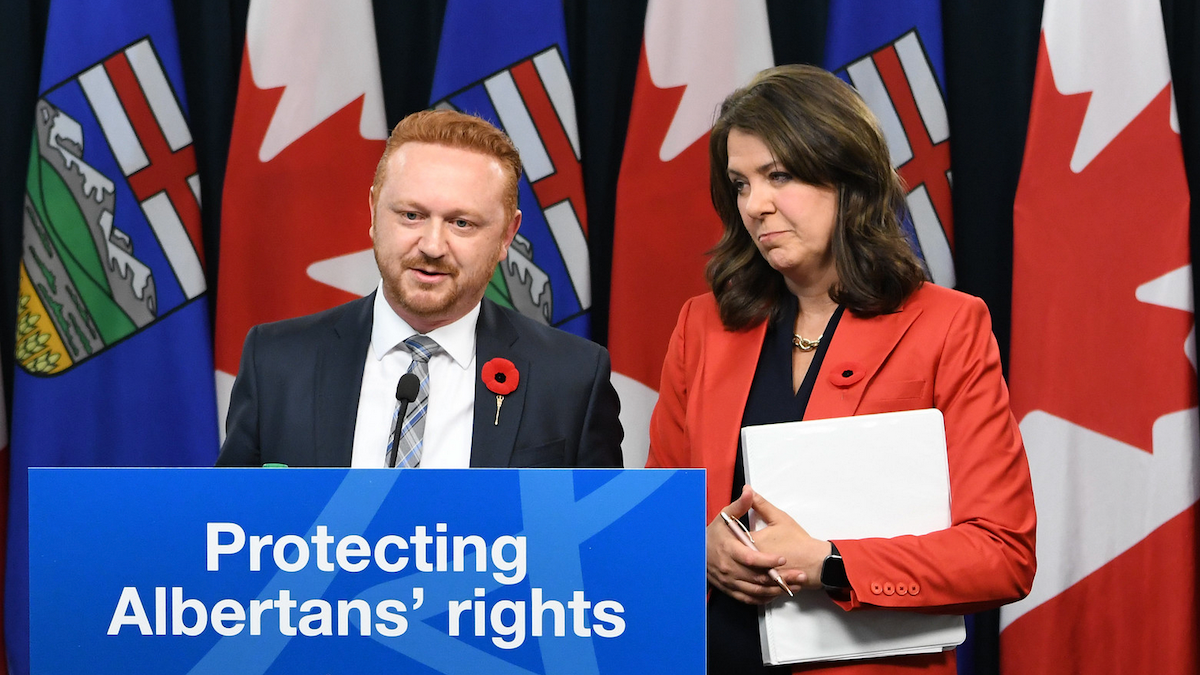Now that we have before us an actual copy of the United Conservative Party (UCP)’s first bill of the fall 2024 sitting of the Legislature, the new and improved Alberta Bill of Rights with secret sovereignty sauce, serious commentators are bound to start commentating seriously about it.
Indeed, to set the tone, the government’s press release about Bill 24 began by talking about the importance of protecting of fundamental rights.
So it bears repeating that that Alberta Bill of Rights Amendment Act, 2024, is a fundamentally unserious document.
Whereas the 1972 Alberta Bill of Rights passed in Premier Peter Lougheed’s first term was well meaning and aspirational, although not of much significance as history has proved because it was not a constitutional document that outweighed other legislation in any way, the 2024 amendments are merely performative, intended to appeal to a UCP fringe that now holds Premier Danielle Smith’s political fate in their hands.
And while the 1972 bill indeed talked about timeless and universally acknowledged fundamental rights, even if it did little to actually protect them, the 2024 version would have us believe it has added fanciful new categories of rights driven by the ephemeral fashion of the perpetually aggrieved American Right.
So in 1972 we tipped our provincial cap to freedom of speech, religion and assembly; in 2024, the UCP would have us salute the right to say no to vaccinations we need, no matter whom we infect, and yes to owning assault rifles we don’t, as long as we do so “in accordance with the law.” (Whatever that means, it would be fair to add.)
“The proposed amendments to the Alberta Bill of Rights address issues important to Albertans and reinforce that Alberta’s government is committed to protecting their rights,” said Justice Minister Mickey Amery in the government’s press release, a quote about as meaningful as this entire exercise.
Alas as for the would-be law-abiding assault-rifle collectors fooled by this performance, University of Alberta law professor Eric Adams told the CBC, “really nothing is being provided of substance that I can see.”
He did, however, suggest the prohibition on requiring immunizations could lead to legal challenges against vaccine mandates, although such mandates seem unlikely as long as the UCP continues to cart off the furniture and pull out the phone lines at Alberta Health Services.
Surely the risk of legal consequences is greater from people infected or otherwise made to suffer by irresponsible unvaccinated health care employees who come to work when they’re ill, and the negligent bosses who allow such behaviour, just sayin’.
Anyway, these fashionable new “rights” seem fundamentally contrary to the notion of peace, order and good government that is firmly entrenched in the actual Canadian Constitution – so they would likely prove ephemeral even if they were included in a constitutional document, which the Alberta Bill of Rights emphatically is not.
So while the commentariat may be tempted to wring its hands about the possibility of costly legal challenges caused by the changes to the Bill of Rights, it is said here, again, that the risk is low, and likely to be short-lived.
Meanwhile, the drafters of the bill appear to have contorted their language into legal pretzels to find ways to allow the UCP keep coercive policies that violate fundamental rights – for example, imprisoning people in “drug treatment” centres and forcing them to take treatment – while insisting they must be able to refuse vaccinations.
Regardless, no matter how fine its words are, and they aren’t all that inspiring, Alberta’s Bill of Rights remains just another organic statute, passed by a simple majority by a provincial Legislature, without any logical legal reason whatsoever for a court to give it precedence over another provincial law, let alone a federal one.
As I noted last month, prime minister John Diefenbaker’s 1960 Canadian Bill of Rights suffered from the same fatal flaw. Courts can only strike down a law by appealing to a higher law, and the Alberta Bill of Rights does not meet that standard.
In real life, you don’t draft a constitution – even for a country that will never exist – by giving three goofs from the Free Alberta Strategy word processors and letting them sit down and start typing. You might even get a better result if you tried to implement the Infinite Monkey Theorem instead of leaving to job to Ms. Smith’s new chief of staff Rob Anderson and his pals.
Thankfully, as NDP Leader Naheed Nenshi pointed out back in September, the Canadian Charter of Rights and Freedoms remains the supreme law of the land, including the Alberta part of it, so that will continue to be the best place to challenge unconstitutional laws, including the ones passed by the UCP majority in the Alberta Legislature.



